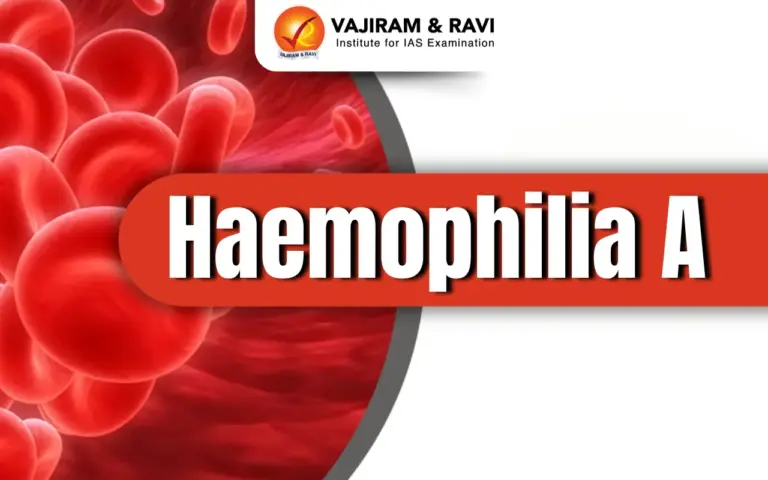Haemophilia A Latest News
A simple and affordable point-of-care test kit has been indigenously developed by the National Institute of Immunohaematology for early diagnosis of genetic bleeding disorders haemophilia A and Von Willebrand Disease.
About Haemophilia A
- It is a hereditary bleeding disorder that happens when your blood doesn’t clot as well as it should.
Haemophilia A Causes
- When you bleed, a series of reactions take place in the body that help blood clots form. This process is called the coagulation cascade.
- It involves as many as 20 different special proteins called coagulation, or clotting, factors.
- You may have a higher chance of excess bleeding if one or more of these factors are missing or are not functioning like they should.
- Factor VIII (eight) is one such coagulation factor. Hemophilia A is the result of the body not making enough factor VIII.
How is Haemophilia A Passed On?
- It is usually caused by an altered gene being passed on to a child by their parents (inherited).
- Men with the altered gene will have symptoms.
- Women with the altered gene (carriers) can have symptoms, but this is less common, and the symptoms are less severe than in men.
Haemophilia A Symptoms
- The severity of symptoms varies. Prolonged bleeding is the main symptom. It is often first seen when an infant is circumcised.
- Other bleeding problems usually show up when the infant starts crawling and walking.
- Mild cases may go unnoticed until later in life.
- Symptoms may first occur after surgery or injury. Internal bleeding may occur anywhere.
- Symptoms may include:
- Bleeding into joints with associated pain and swelling
- Blood in the urine or stool
- Bruising
- Gastrointestinal tract and urinary tract bleeding
- Nosebleeds
- Prolonged bleeding from cuts, tooth extraction, and surgery
- Bleeding that starts without cause
Haemophilia A Treatment
- Healthcare providers typically treat hemophilia A with factor replacement therapy.
- Healthcare providers will inject concentrated factor VIII into your bloodstream.
- Factor VIII replaces the missing blood protein, or factor, that helps blood to clot
Key Facts about Von Willebrand Disease (VWD)
- VWD is a blood disorder in which the blood does not clot properly.
- Cause: People with the disease have low levels of von Willebrand factor, a protein that helps blood clot, or the protein doesn’t perform as it should.
- Most people with the disease are born with it, having inherited it from one or both parents.
Von Willebrand Disease Symptoms
- VWD does not always cause symptoms unless you have an injury.
- Sometimes it’s found when you have more bleeding than usual after surgery or giving birth.
- Symptoms of VWD can include:
- bruising easily
- frequent nosebleeds
- bleeding gums
- bleeding more than usual after an injury or cut
- heavy periods
- Some people also have more severe symptoms, such as:
- heavy bleeding that’s difficult to stop, for example, after an injury or procedure
- blood in your poo
- blood in your pee (urine)
- pain, swelling and stiffness in a joint
Von Willebrand Disease Treatment
- VWD can’t be cured.
- But with treatment and self-care, most people with this disease can lead active lives.
Source: ET
Last updated on February, 2026
→ UPSC Notification 2026 is now out on the official website at upsconline.nic.in.
→ UPSC IFoS Notification 2026 is now out on the official website at upsconline.nic.in.
→ UPSC Calendar 2026 has been released.
→ UPSC Final Result 2025 is expected to be released in the first week of March 2026.
→ Check out the latest UPSC Syllabus 2026 here.
→ Join Vajiram & Ravi’s Interview Guidance Programme for expert help to crack your final UPSC stage.
→ UPSC Mains Result 2025 is now out.
→ UPSC Prelims 2026 will be conducted on 24th May, 2026 & UPSC Mains 2026 will be conducted on 21st August 2026.
→ The UPSC Selection Process is of 3 stages-Prelims, Mains and Interview.
→ Prepare effectively with Vajiram & Ravi’s UPSC Prelims Test Series 2026 featuring full-length mock tests, detailed solutions, and performance analysis.
→ Enroll in Vajiram & Ravi’s UPSC Mains Test Series 2026 for structured answer writing practice, expert evaluation, and exam-oriented feedback.
→ Join Vajiram & Ravi’s Best UPSC Mentorship Program for personalized guidance, strategy planning, and one-to-one support from experienced mentors.
→ Check UPSC Marksheet 2024 Here.
→ UPSC Toppers List 2024 is released now. Shakti Dubey is UPSC AIR 1 2024 Topper.
→ Also check Best UPSC Coaching in India
Haemophilia A FAQs
Q1. What is the hemophilia A?+
Q2. What is the mainstay of treatment for Haemophilia A?+
Q3. Which organ systems may show bleeding symptoms in a person with Haemophilia A?+
Tags: haemophilia a prelims pointers upsc current affairs upsc prelims current affairs


















